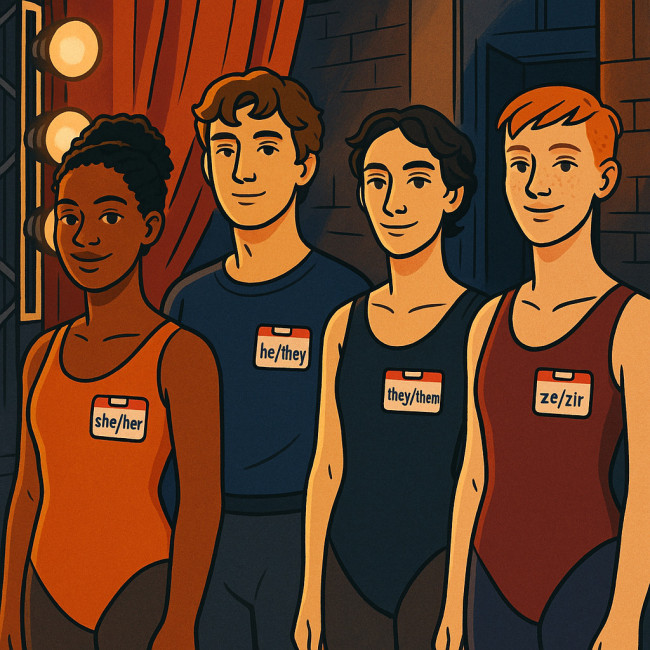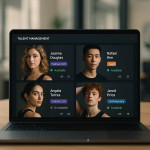Inclusive bio writing: pronouns and tone that resonate beyond the dance floor
Want recruiters, collaborators and fans to remember you after a single profile click? An inclusive bio—built on clear pronouns and welcoming language—makes you relatable, trustworthy and searchable. Follow this guide to craft a bio that shines on stage-focused platforms and everywhere else your name appears.
Why inclusive language matters long after the curtain closes
Booking teams review hundreds of dancer profiles daily. Inclusive bios help them:
- Simplify etiquette – Clear pronouns remove guesswork and prevent awkward introductions at rehearsals.
- Boost brand alignment – Many agencies now screen for inclusivity to meet diversity pledges.
- Widen audience reach – Fans who discover you through the Female Dancers directory on Artfolio are more likely to follow talent that recognises varied identities.
- Lift search visibility – Algorithms rank profiles with consistent, keyword-rich language higher in relevant queries.
Core elements of an inclusive bio

Before diving into specific wording tips, picture the core mission of an inclusive bio: signal at first glance that everyone is welcome to pronounce your name correctly, address you respectfully and envision working with you. That means stating your pronouns, yes, but it also means curating details that affirm multiple identities, abilities and cultural backgrounds. Think of your bio as a digital foyer; its language should lower the threshold for conversation, whether the visitor is a casting director, a first-time audience member or a fellow artist looking to collaborate on an experimental piece that fuses hip-hop and Bharatanatyam. By deliberately choosing active verbs, people-first phrases and concrete achievements, you turn what could be a flat résumé bullet into a mini narrative that champions diversity without slipping into tokenism. When this clarity intersects with strong SEO keywords—“contemporary dancer Paris,” “Latin fusion choreographer,” “wheelchair dancer advocate”—your profile becomes both discoverable and relatable, setting you apart in a sea of generic descriptors.
Pronouns that empower, not distract
Place pronouns right after your name—“Jae Morgan (they/them)”. This position:
- Makes search snippets clearer.
- Signals respect for gender diversity.
- Reduces accidental misgendering in press releases.
Stick to widely understood formats (she/her, he/him, they/them, she/they, etc.). If you use neopronouns, add a brief cue: “Ze/zir (pronounced zee/zeer)”.
Tone and word choice that welcome everyone
Keep sentences active and audience-focused:
- Swap “X has performed internationally” for “I tour across Europe and Asia.”
- Replace clichés such as “born to dance” with one vivid accomplishment.
- Use people-first references: “dancers with disabilities” instead of “disabled dancers.”
Need more storytelling punch? Study craft narrative-driven bios for step-by-step inspiration.
Step-by-step template you can copy today
- Hook (25 words) – Name, pronouns, dance style specialty, recent standout credit.
- Value – Describe the experience you create for audiences or directors (energetic, immersive, emotionally raw…).
- Proof – One award, residency or media mention.
- Human touch – A hobby or cause that reveals personality.
- Call to action – Direct people to view a reel, upgrade their viewing experience or send a booking request.
Quick reference table: pronoun placement & tone tweaks
| Bio Element | Inclusive Best-Practice | Common Misstep |
|---|---|---|
| Name line | “Samir Patel (he/they)” | Pronouns hidden at end of paragraph |
| Voice | Active: “I fuse hip-hop footwork with classical lines.” | Passive: “A fusion of…” |
| Achievements | One concrete stat: “Sold-out 500-seat gala.” | Vague hype: “World-class performer.” |
| Length | 80–120 words on directories | 300-word wall of text |
| SEO keywords | Style + city: “contemporary dancer Paris” | Keyword stuffing list |
Common mistakes that repel modern readers
- Pronoun overload – Listing every possible pronoun can confuse recruiters.
- Gendered honorifics – Use “Dance artist” over “Ballerina” unless style-specific.
- Assuming able-bodied default – Describe choreography without implying one “normal” body.
- No accessibility cues – Add alt-text to images; read how in captioned videos and alt text.
- Ignoring directory tags – Pair inclusive wording with directory keywords that boost visibility.
Mini-quiz: test your inclusive bio instincts
FAQ
- How do I choose which pronouns to list?
- Use the pronouns you want colleagues to say aloud. If you are comfortable with multiple sets, list them in order of preference.
- Should I update my bio if my pronouns change?
- Yes. Update immediately across all platforms to keep press releases, programmes and directory tags consistent.
- What tone resonates with inclusive audiences?
- Active verbs, people-first language and concrete achievements. Avoid adjectives that reinforce stereotypes such as “feminine grace” unless artistically relevant.
- Can I use emojis in a professional dance bio?
- One or two clear emojis (🎭, 💃) can humanise your profile, but overuse risks accessibility issues for screen-reader users.
- How long should an inclusive bio be?
- Aim for 80–120 words on talent directories; reserve longer narratives for personal websites or grant applications.
Ready to refresh your bio?
Start by editing your name line with pronouns, trim passive phrases and test your new copy on a friend from outside the dance world. The sooner your bio sounds like you, the sooner casting teams will remember your talent—and hit that book now button. Share the updated version on social media to invite feedback, and note any phrases that spark questions—you'll know exactly where to clarify next time while maintaining a confident, inclusive tone that never goes out of style.
Next step: Paste your updated text into your profile today and track profile views for the next seven days.











